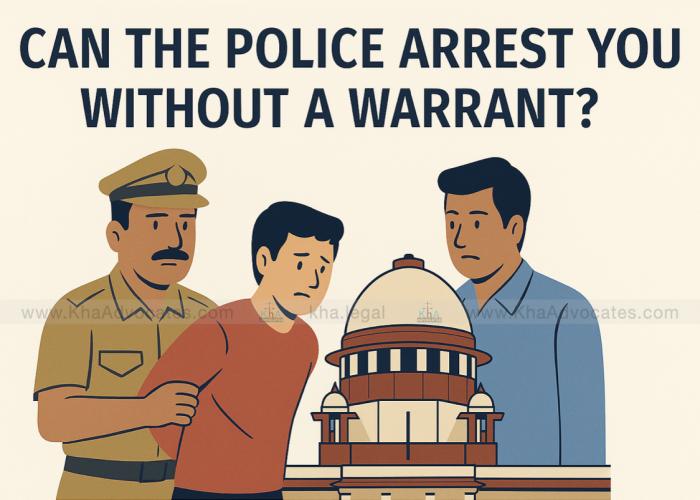
Published on: June 1, 2024
Introduction
The question “Can the police arrest you without a warrant?” is one of the most frequently asked by individuals concerned about their legal rights in India. While the Constitution of India guarantees the right to life and personal liberty under Article 21, the Code of Criminal Procedure (CrPC) lays down clear procedures governing arrest, both with and without a warrant.
This article explores the legality, exceptions, and judicial scrutiny of arrests without warrants in India, supported by landmark Supreme Court judgments, case analysis, and remedies.
This section allows police to arrest a person without a warrant in certain situations:
If a person has committed a cognizable offence
If the arrest is necessary to prevent further offence
To ensure proper investigation
To prevent the person from tampering with evidence or threatening witnesses
To ensure presence in court proceedings
However, the Supreme Court has significantly narrowed the scope of such powers to prevent misuse and protect individual liberty.
Arnesh Kumar v. State of Bihar (2014)
Held:
Police must not arrest automatically in cases where punishment is less than 7 years. Arrest should follow a reasoned satisfaction, and the officer must justify the arrest.
Impact:
This landmark case emphasized the importance of safeguarding personal liberty and mandated adherence to Section 41A CrPC — requiring a notice of appearance before arrest.
Held:
The Court laid down guidelines to be followed during arrests to prevent custodial violence and abuse of power.
Key Directives:
Memo of arrest to be prepared and signed by witness
Family/friends must be informed of arrest
Right to consult a lawyer
Medical examination every 48 hours
These guidelines are now part of constitutional protections under Article 21.
Held:
Merely having the power to arrest does not justify the exercise of that power. Arrest must be just, fair, and reasonable.
Situation | Is Warrant Needed? | Reason | ||||||||||||||
|---|---|---|---|---|---|---|---|---|---|---|---|---|---|---|---|---|
Murder | ❌ No | Cognizable offence | ||||||||||||||
Theft | ❌ No | Cognizable offence | ||||||||||||||
Domestic Violence (under Sec 498A IPC) | ✅ Sometimes | Subject to Arnesh Kumar Guidelines | ||||||||||||||
Breach of Peace | ✅ Yes | Usually needs warrant unless immediate risk | ||||||||||||||
Bailable Offence (punishment < 7 years) | ✅ Yes | Section 41A CrPC applies |
File a Writ Petition (Habeas Corpus)
Under Article 226 or 32 of the Constitution if illegal detention occurs.
Bail Application
Immediate legal relief under Section 436/437/438 CrPC.
Contempt of Court
Violation of DK Basu guidelines can lead to contempt proceedings.
Compensation
In Rudal Shah v. State of Bihar, SC awarded compensation for wrongful detention.
Police Complaint and Departmental Action
Illegal arrest can be reported to the Human Rights Commission or Police Complaints Authority.
Section | Provision |
|---|---|
41 | Arrest without warrant for cognizable offence |
41A | Notice for appearance before arrest |
42 | Arrest for non-cognizable offence if refusal to disclose identity |
50 | Right to know grounds of arrest |
57 | No detention beyond 24 hours without Magistrate’s approval |
While police can arrest without warrant in certain cases, such powers are not absolute. Indian courts have stressed on the principle of “custody as exception, liberty as rule.” Unlawful arrests can be challenged and remedied legally.
Always consult a criminal lawyer immediately if you or someone you know is arrested without proper procedure.
KHA Advocates is a reputed law firm with extensive experience in criminal litigation. We assist with:
Legal consultation and bail applications
Filing writs against illegal arrests
Police complaints and human rights violations
High Court & Supreme Court representation
🔗 Click to Book Consultation Now or WhatsApp us +91-8101-555-666 for urgent legal help.
